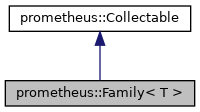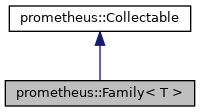A metric of type T with a set of labeled dimensions. More...
#include <family.h>


Public Member Functions | |
| Family (const std::string &name, const std::string &help, const Labels &constant_labels) | |
| Create a new metric. | |
| template<typename... Args> | |
| T & | Add (const Labels &labels, Args &&... args) |
| Add a new dimensional data. | |
| void | Remove (T *metric) |
| Remove the given dimensional data. | |
| bool | Has (const Labels &labels) const |
| Returns true if the dimensional data with the given labels exist. | |
| const std::string & | GetName () const |
| Returns the name for this family. | |
| const Labels & | GetConstantLabels () const |
| Returns the constant labels for this family. | |
| std::vector< MetricFamily > | Collect () const override |
| Returns the current value of each dimensional data. | |
Detailed Description
class prometheus::Family< T >
A metric of type T with a set of labeled dimensions.
One of Prometheus main feature is a multi-dimensional data model with time series data identified by metric name and key/value pairs, also known as labels. A time series is a series of data points indexed (or listed or graphed) in time order (https://en.wikipedia.org/wiki/Time_series).
An instance of this class is exposed as multiple time series during scrape, i.e., one time series for each set of labels provided to Add().
For example it is possible to collect data for a metric http_requests_total, with two time series:
- all HTTP requests that used the method POST
- all HTTP requests that used the method GET
The metric name specifies the general feature of a system that is measured, e.g., http_requests_total. Labels enable Prometheus's dimensional data model: any given combination of labels for the same metric name identifies a particular dimensional instantiation of that metric. For example a label for 'all HTTP requests that used the method POST' can be assigned with method= "POST".
Given a metric name and a set of labels, time series are frequently identified using this notation:
<metric name> { < label name >= <label value>, ... }
It is required to follow the syntax of metric names and labels given by: https://prometheus.io/docs/concepts/data_model/#metric-names-and-labels
The following metric and label conventions are not required for using Prometheus, but can serve as both a style-guide and a collection of best practices: https://prometheus.io/docs/practices/naming/
Constructor & Destructor Documentation
◆ Family()
| prometheus::Family< T >::Family | ( | const std::string & | name, |
| const std::string & | help, | ||
| const Labels & | constant_labels | ||
| ) |
Create a new metric.
Every metric is uniquely identified by its name and a set of key-value pairs, also known as labels. Prometheus's query language allows filtering and aggregation based on metric name and these labels.
This example selects all time series that have the http_requests_total metric name:
http_requests_total
It is possible to assign labels to the metric name. These labels are propagated to each dimensional data added with Add(). For example if a label job= "prometheus" is provided to this constructor, it is possible to filter this time series with Prometheus's query language by appending a set of labels to match in curly braces ({})
http_requests_total{job= "prometheus"}
For further information see: [Querying Basics] (https://prometheus.io/docs/prometheus/latest/querying/basics/)
- Parameters
-
name Set the metric name. help Set an additional description. constant_labels Assign a set of key-value pairs (= labels) to the metric. All these labels are propagated to each time series within the metric.
- Exceptions
-
std::runtime_exception on invalid metric or label names.
Member Function Documentation
◆ Add()
|
inline |
Add a new dimensional data.
Each new set of labels adds a new dimensional data and is exposed in Prometheus as a time series. It is possible to filter the time series with Prometheus's query language by appending a set of labels to match in curly braces ({})
http_requests_total{job= "prometheus",method= "POST"}
- Parameters
-
labels Assign a set of key-value pairs (= labels) to the dimensional data. The function does nothing, if the same set of labels already exists. args Arguments are passed to the constructor of metric type T. See Counter, Gauge, Histogram or Summary for required constructor arguments.
- Returns
- Return the newly created dimensional data or - if a same set of labels already exists - the already existing dimensional data.
- Exceptions
-
std::runtime_exception on invalid label names.
◆ Collect()
|
overridevirtual |
Returns the current value of each dimensional data.
Collect is called by the Registry when collecting metrics.
- Returns
- Zero or more samples for each dimensional data.
Implements prometheus::Collectable.
◆ GetConstantLabels()
| const Labels & prometheus::Family< T >::GetConstantLabels | ( | ) | const |
Returns the constant labels for this family.
- Returns
- All constant labels as key-value pairs.
◆ GetName()
| const std::string & prometheus::Family< T >::GetName | ( | ) | const |
Returns the name for this family.
- Returns
- The family name.
◆ Has()
| bool prometheus::Family< T >::Has | ( | const Labels & | labels | ) | const |
Returns true if the dimensional data with the given labels exist.
- Parameters
-
labels A set of key-value pairs (= labels) of the dimensional data.
◆ Remove()
| void prometheus::Family< T >::Remove | ( | T * | metric | ) |
Remove the given dimensional data.
- Parameters
-
metric Dimensional data to be removed. The function does nothing, if the given metric was not returned by Add().